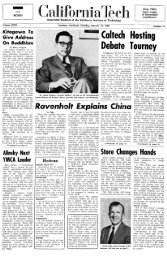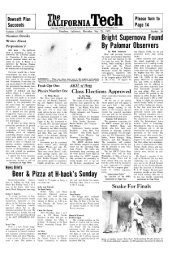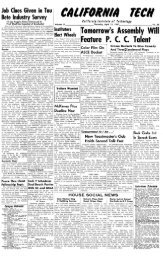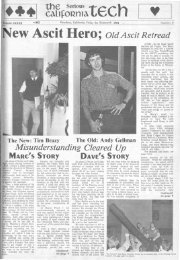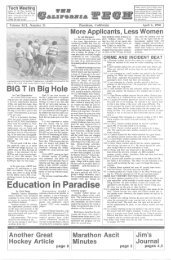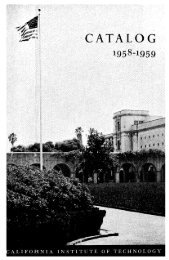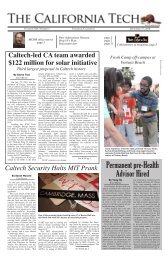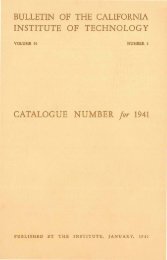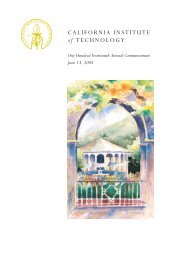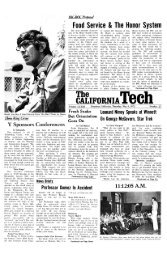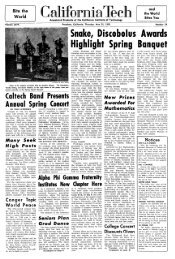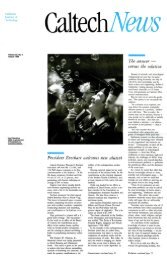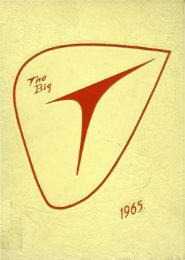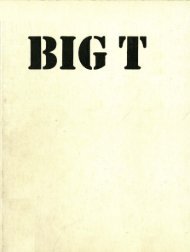CALTECH NEWS - CaltechCampusPubs
CALTECH NEWS - CaltechCampusPubs
CALTECH NEWS - CaltechCampusPubs
You also want an ePaper? Increase the reach of your titles
YUMPU automatically turns print PDFs into web optimized ePapers that Google loves.
The Tax Reform Act: What to do before year end<br />
To help maximize the benefits and minimize the disadvantages of the new law, four<br />
steps are recommended.<br />
This article was written by Tom<br />
Gelder, Caltech '5 director of gift and<br />
estate planning.<br />
The Tax Reform Act of 1986 is the<br />
most massive revision of the Internal<br />
Revenue Code since its first enactment.<br />
It will take the IRS a good deal<br />
of time to fully explain the new statutes<br />
by means of revenue rulings and<br />
regulations.<br />
. To help maximize the benefits and<br />
minimize the disadvantages of the<br />
new law, four steps are recommended<br />
before the end of the year.<br />
Some will obviously be more<br />
meaningful than others, depending<br />
upon an individual's circumstances.<br />
1. Consult tax and financial advisers.<br />
Numerous provisions take effect<br />
January 1, 1987, while others are<br />
phased in over various time periods;<br />
some are too complicated for most of<br />
us to understand.<br />
2. Maximize deductions in 1986<br />
while they are still permitted. Many<br />
will no longer be available after<br />
this year.<br />
3. Delay the receipt of income to<br />
1987 and beyond when tax rates will<br />
be lower.<br />
4. If the sale of appreciated assets<br />
is contemplated in the near future,<br />
make the sale before the end of 1986.<br />
Of the foregoing, the key to surviving<br />
the new tax law is to check<br />
with your lawyer or accountant now<br />
and to act before year-end.<br />
Following are brief descriptions of<br />
some of the changes. The list is<br />
neither exhaustive nor are the highlighted<br />
provisions necessarily true in<br />
all cases. As with many tax laws,<br />
there are exceptions to the<br />
general rules.<br />
• Tax rates will be reduced to a<br />
two-rate structure: 15 percent and 28<br />
percent. The highest tax bracket will<br />
fall from 50 percent to 38.5 percent<br />
in 1987 and to 28 percent in 1988.<br />
• The capital gains tax will be repealed.<br />
Appreciation on the sale of<br />
capital assets will be taxed the same<br />
as other income but no more than 28<br />
percent. The capital gains tax rate for<br />
corporations will be 34 percent.<br />
• Deductions from gross income<br />
have been reduced or repealed:<br />
a. Interest on loans for other than<br />
a personal residence or a "second<br />
home" will no longer be deductible.<br />
(To be phased in over five years.)<br />
b. State and local sales taxes will<br />
no longer be deductible.<br />
c. The charitable income tax deduction<br />
for non-itemizers - those<br />
who take the standard deductionwill<br />
no longer be available. (This will<br />
apply to about 80 percent of all<br />
taxpayers. )<br />
d. The "floor" for claiming the<br />
medical expense deduction will be<br />
raised from 5 percent to 7.5 percent<br />
of adjusted gross income.<br />
• The" standard deduction" for all<br />
individuals has been increased. By<br />
1989 the deduction will be $2,000 per<br />
person. The deduction for a married<br />
couple in 1986 is $3,670.<br />
• Gifts of appreciated property<br />
from individuals who itemize their<br />
. deductions will continue to generate<br />
a deduction equal to the fair market<br />
value of the gift at the time the gift is<br />
made. For those taxpayers who are<br />
subject to the "alternative minimum<br />
tax," gifts of appreciated property<br />
must be included as tax preference<br />
items. This means that, for some, the<br />
appreciated portion of their gifts will<br />
be taxed at a 21 percent rate.<br />
• Eligibility and vesting requirements<br />
for employee pension plans<br />
will be liberalized. Future regulations<br />
have to be published before this area<br />
is fully understood.<br />
• Scholarship and fellowship aid,<br />
over and above tuition and courserequired<br />
fees, books, etc., will be<br />
taxable. In addition, unless the recipient<br />
is a degree candidate, the entire<br />
scholarship or fellowship is taxable.<br />
• Prizes and awards for such<br />
things as scientific or artistic achievement,<br />
like the Nobel Prize, will be<br />
fully taxable unless the award is assigned<br />
to charity.<br />
• All unemployment compensation<br />
is taxable.<br />
• Faculty housing is taxable if the<br />
rent charged is less than 5 percent of<br />
the property's appraised value.<br />
• It will no longer be possible to<br />
shift income to children in a lower income<br />
tax bracket by setting up educational<br />
trusts to fund children's<br />
education. The income will be taxed<br />
at the parents' higher tax rate.<br />
• Business meals and entertainment<br />
expenses will be only 80 percent deductible.<br />
• The $100-$200 dividend exclusion<br />
is repealed .<br />
• Income averaging is no longer<br />
available.<br />
• Ten-year averaging on lump sum<br />
distributions from pension plans is reduced<br />
to five years with some exceptions<br />
for taxpayers over age 50.<br />
• The penalty for early withdrawals<br />
from pension plans has been<br />
increased to 10 percent.<br />
The changes made by the Tax Reform<br />
Act are substantial and far<br />
reaching, but not all the changes are<br />
bad. In fact, many taxpayers will actually<br />
pay less income tax. The most<br />
troublesome aspect of the new act is<br />
the uncertainty it causes as we each<br />
try to assess its effects on our particular<br />
financial situation. Unfortunately,<br />
at this point in time, even IRS is unable<br />
to provide that information. The<br />
best we can do is have patience and<br />
maintain close contact with a trusted<br />
tax adviser.<br />
Rosen featured in campus program<br />
Benjamin M. Rosen, a<br />
m ember of the Caltech<br />
Board of Trustees and a<br />
leading venture capitalist,<br />
was the opening speaker<br />
at a program on "Getting<br />
to Market in High<br />
Technology" presented by<br />
Caltech, the Industrial<br />
Relations Center, and the<br />
Caltech! MIT Enterprise<br />
Forum. Rosen has been<br />
the founding investor and<br />
director of 31 high<br />
technology companies.<br />
They're off<br />
to China to make<br />
dreams come true<br />
Continued from page 5<br />
will make another trip there next<br />
year, and he is postponing use of the<br />
grant until them.<br />
Mark Ragins (BS '79) is a resident<br />
in psychiatry at the USC School of<br />
Medicine. Ragins will use his grant to<br />
spend two months exploring the psychiatric<br />
care system in China.<br />
Theron Stanford, a Cal tech senior,<br />
has enjoyed puzzles and games all of<br />
his life. He plans to spend most of his<br />
time in Beijing, Shanghai, and Heifei,<br />
learning from students about the puzzles<br />
and recreations popular among<br />
young people there.<br />
David Valdez (BS '81), who has<br />
been at JPL as an optical engineer, is<br />
a self-taught painter who began to<br />
work in photorealism and now concentrates<br />
on portraits and caricatures.<br />
In China now, he is seeking out other<br />
self-taught artists who do the same<br />
type of work as he, concentrating his<br />
efforts in Shanghai and Beijing.<br />
Nine unique individuals; nine adventures.<br />
For Stan Avery specifically,<br />
and for his children and the trustees<br />
of the Durfee Foundation, and for the<br />
grant recipients, the next months will<br />
be a very special time.<br />
Camilla Frost<br />
receives Armand<br />
Hammer Award<br />
Camilla Chandler Frost, a member of the<br />
Caltech Board of Trustees, is recipient of<br />
the seventh annual Armand Hammer<br />
Award. This honor is given each year to an<br />
individual or organization making an outstanding<br />
contribution to the cultural life of<br />
Los Angeles. Mrs. Frost is the wife of F<br />
Daniel Frost, senior partner in the fim, of<br />
Gibson, Dunn and Crutcher. She l,as<br />
served as president and chaim,an of the<br />
board of directors of the Los Arlgeies<br />
County Museum of Art and is chainnan of<br />
the executive committee of the museum.<br />
She is a long-time supporter of the<br />
visual arts.



